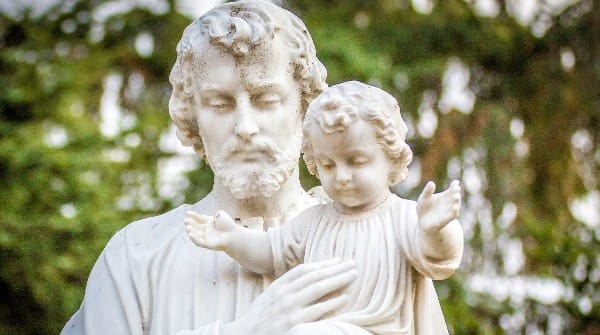Saint Joseph, as foster father of Jesus and head of the Holy Family, had an exalted and most responsible vocation — namely, to open the way for the redemption of the world and to prepare” for it by the introduction, education, and guidance of the youth of the God-Man. In this work, Saint Joseph cooperated as the instrument of the Holy Spirit. The latter was the guide; Saint Joseph obeyed and carried out the enterprises. It is attractive, instructive, and edifying to consider how the saint corresponded to the guidance of the Holy Spirit. We find in this connection two classes of circumstances in the life of the saint in which his conduct may be a model for us.
Under the first set of circumstances God desires something of us and leaves to us the choice, not revealing His purpose clearly to us, but remaining silent. Saint Joseph probably found himself placed in such circumstances in regard to his espousals with Mary, and afterward in his perplexity as to whether he could take Mary as his wife, and again, on the return from Egypt, when he hesitated about choosing Bethlehem or Nazareth as the domicile of the Holy Family. In such a case, the only thing to be done is to seek advice from a fellow man, or to consult one’s own prudence and conscientiousness, or finally, from the circumstances them- selves, to discern God’s will. Thus may the saint have determined to espouse Mary through the advice obtained from the priests and heads of families. In the torturing perplexity regarding the virginity of his spouse, he consulted his conscience and his good and noble human heart without any regard to the voice of pas- sion, until God Himself manifested His will through an angel. Finally, in his choice of Nazareth as the permanent dwelling place of the Holy Family, he was guided by his own prudence, which judged Archelaus to be as unreliable as Herod, his father. And in this decision the saint was afterward confirmed by God Himself.
In the second set of circumstances, God, indeed, makes known His will and points out the goal but leaves to us the choice and application of the means to reach it. The only thing for one to do in this case is to put aside all attachment to one’s own will by conquering oneself, and without fear or hesitation to embrace and carry out God’s will with full confidence. Such was Saint Joseph’s position when God commanded him to take the Child and fly into Egypt. The purpose was clear, but the means to carry it out were left to Joseph’s ingenuity. And he did carry out the command with determination, courage, and perseverance. How unselfish and adaptable must have been the man whom the bare intimation of God’s will took from one part of the world to the other, as docile as a lamb, which allows itself to be led with a cord! Shall not Joseph in his obedience be likened to the swift cloud upon which the Lord desires to appear in Egypt (Isa. 19:1)?
Saint Joseph, then, seems to have been raised by God to be a patron in moments when a difficult choice is to be made, especially in the choice of one’s vocation in life, a matter of para- mount importance to all. If at times a single choice may be fraught with important and serious consequences, how much more the decision that settles one’s career for life, as in the case of a vocation or choice of a state of life? In this matter we must follow the example of Saint Joseph and trust in his help.
+
This article is adapted from a chapter in The Truth About Saint Joseph, by Fr. Maurice Meschler, which is available from Sophia Institute Press.

Art for this post on the St. Joseph: Cover and featured image used with permission.




